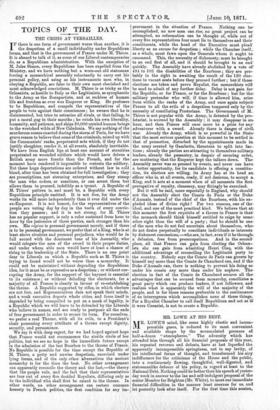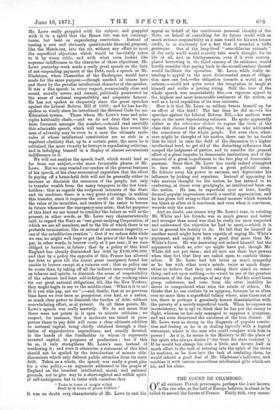MR. LOWE AT HIS BEST. Mr. Lowe really grappled with
his subject, and grappled with it in a spirit that the House felt was not contemp- tuous, but bent on engendering conviction. Instead of tossing a new and obviously questionable financial proposal, like the Match-tax, into the air, without any effort to meet the superficial objections which would be inevitably taken to it by every critic, and with what even looked like supreme indifference to the character of those objections, Mr. Lowe yesterday week made a really great speech on the duty of not suspending payment of the Debt, such a speech as Mr. Gladstone, when Chancellor of the Exchequer, would have made for the same purpose,—though marked of course here and there by the peculiar intellectual character of the speaker. It was a fine speech in every respect, economically clear and sound, morally severe and earnest, politically penetrated by the sense of national responsibility and corporate honour. He has not spoken so eloquently since the great speeches against the Liberal Reform Bill of 1866; and he has hardly spoken so wisely since he introduced the Revised Code for our Education system. Those whom Mr. Lowe's tone and prin- ciples habitually chafe,—and we do not deny that we have been foremost amongst the number,—should read carefully this admirable speech, which will teach them how sweet the uses of adversity may be even to a man the ultimate mole- cules of whose intellectual constitution are so rich in a repellent elasticity that, up to a certain point, the more he is criticized, the more vivacity he betrays in repudiating criticism, and in indulging himself in a display of almost ostentatious indifference to it.
We will not analyze the speech itself, which would lead us far from our subject,—the more favourable phases of Mr. Lowe. But we may remind our readers of the general features of his speech, of his clear economical exposition that the effect fo paying off a home-held debt will not be generally either to increase or diminish the resources of the people, but only to transfer wealth from the many taxpayers to the few fund- holders ; that as regards the reciprocal interests of the State and its creditors, there is a very great advantage in making this transfer, since it improves the credit of the State, raises the value of its securities, and renders it far easier to borrow in future whenever the emergency may arise; that for purposes of this kind we are bound to consider the future as well as the present, in other words, as Mr. Lowe very characteristically said, to regard the State as "one great undying Corporation, of which we are all members, and to the life of which there is no probable termination, like an animal of enormous longevity,— one of the antediluvian creation "; that if we reduce debt while we can, we might well hope to get the price of the funds up to par, in other words, to borrow really at 3 per cent., if we were obliged to borrow, in future ; that by a policy of this kind England has already diminished her debt by £100,000,000, and that by a policy the opposite of this, France has allowed her debt to grow till the recent great emergency found her unable to borrow except at a ruinous cost ; that no policy can be worse than, by taking off all the indirect taxes except those on tobacco and spirits, to diminish the sense of responsibility of the soberest and least self-indulgent of the working-class \ for our great national obligations, till, like the New Yorkers, they might begin to say to the middle-class, "What is it to us? It is you who pay, not we ";—and, finally, that at no previous time have we ever been so prosperous, ever had, as a nation, so Much clear power to diminish the burden of debt, without overwhelming effort, as at present. On all these points, Mr. Lowe's speech was really masterly. We do not mean that there were not points in it open to minute criticism ; we suspect, for instance, that a moderate tax raised in pros- perous times to pay debt will cause a clear ultimate addition to national capital, being chiefly obtained through a limi- tation of unproductive expenditure, and usually devoted, in the hands of the fundholder to whom it represents invested capital, to purposes of production ; but if this be so, it only strengthens Mr. Lowe's case, instead of weakening it ; and were it otherwise, a statement of this kind should not be spoiled by the introduction of minute side- discussions which only distract public attention from its main drift. Taken as a whole, the speech was really a great plea for a wise policy,—an argument addressed to the people of England on the broadest intellectual, moral, and national grounds, not to give way to a short-sighted and selfish spirit of self-indulgence, but to insist with ourselves that
" Tasks in hours of insight willed Shall be in hours of gloom fulfilled."
It was no doubt very characteristic of Mr. Lowe to cast his appeal on behalf of the continuous personal identity of the State, on behalf of consulting for its future credit with as much anxious responsibility as a man would for his own future credit, in so studiously low a key that it sounded a trifle grotesque. One of the long-lived " ante-diluvian animals" of the early world would scarcely take much thought for its life at all, and an Ichthyosaurus, even if it ever contem plated borrowing in the third century of its existence, would hardly consider that paying back in the second century thereof would facilitate the operation. Mr. Lowe, while really in- tending to appeal to the most disinterested sense of obliga- tion men can feel,—the obligation towards a world as yet unborn,—could not quite resist the temptation to laugh at himself and strike a jarring string. Still the tone of the whole speech was unmistakably fine,—a vigorous appeal to the highest and most honourable sentiment of the nation, as well as a lucid exposition of its true interests.
How is it that Mr. Lowe so seldom braces himself up for an effort of this kind ? The last time he did so,—in his speeches against the Liberal Reform Bill,—his motives were open to the most depreciating estimate. He spoke apparently rather as the advocatus diaboli to expose the vices of the class that claimed the suffrage, than as one who addressed the conscience of the whole people. Yet even then, what- ever might be thought of his motive, there can be no doubt that he tried to raise the field of the discussion to a higher intellectual level, to get rid of the disturbing influences that warped the judgment of parties, and to consider the general effect of a great impulse to democratic institutions, and of the removal of a great impediment to the free play of democratic passions. Since then Mr. Lowe has rarely indeed attempted to face with equal boldness a great political issue. He fritters away his power in sarcasm, and depreciates his influence by jerking out repartees. Instead of appearing to take anxious thought for the nation, he has seemed to be conferring, at times even grudgingly, an intellectual boon on the nation. He has, to superficial eyes at least, hardly deemed popular impressions worth a careful appreciation, and he has given full swing to that off-hand manner which wounds ten times as often as it convinces, and even when it convinces,. wounds only the more.
And no doubt, one reason why Mr. Lowe's tone, in refuting Mr. White and his friends, was so much graver and better and stronger than usual was that he really for once respected and understood the objection he had to meet,—which it is not in general his destiny to do. He felt that he himself in another mood might have been capable of urging Mr. White's argument, and urging it with a good deal more than Mr. White's force. He was answering not indeed himself, but the arguments which an alter ego might have put, though Mr. White did not put them ; and all men use their best powers when they feel that they are called upon to confute them- selves. If Mr. Lowe had but twice as much sympathy as he has with other men's minds, twice as much dispo- sition to believe that they are taking their stand on some- thing, and not upon nothing,—he would be one of the greatest statesmen of the day, perhaps of any day. But his mind loses grasp, coherence, and tone, from the utter inability he shows to comprehend what stirs the minds of others. He thinks that he can confute by an epigram, because he so often sees no more than a superficial fallacy where, nine times out of ten, there is perhaps a genuinely honest dissatisfaction with the poverty of a merely superficial truth. When he exposes an inconsistency, he is apt to think that he has put the enemy to flight, whereas he has only managed to suppress a symptom,. and not even discovered the existence of the true disease. If Mr. Lowe were as strong in the diagnosis of popular convic- tion and feeling as he is in dealing logically with a logical statement, where is the man who could compare with him in power ? As it is, he seems in the Ministry to fill the place of the spirit who always denies (" der Geist der stets verneint If he would but change his role a little, and devote half as much effort to the task of entering into the spirit of the views he confutes, as he does into the task of confuting them, he would inherit a good deal of Mr. Gladstone's influence, and combine it with various marvellous intellectual gifts which are his, and his alone.



































 Previous page
Previous page